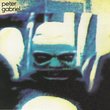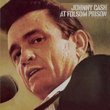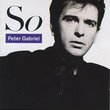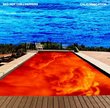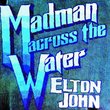| All Artists: Peter Gabriel Title: Peter Gabriel Members Wishing: 1 Total Copies: 0 Label: Geffen Records Release Date: 10/25/1990 Genres: Alternative Rock, International Music, Pop, Rock, Classic Rock Styles: Europe, Britain & Ireland, Progressive, Progressive Rock, Album-Oriented Rock (AOR) Number of Discs: 1 SwapaCD Credits: 1 UPC: 720642203521 |
Search - Peter Gabriel :: Peter Gabriel
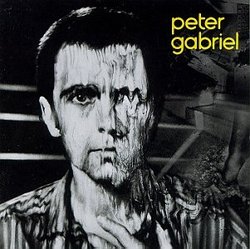 | Peter Gabriel Peter Gabriel Genres: Alternative Rock, International Music, Pop, Rock, Classic Rock
2002 remastered pressing. Peter Gabriel's third self-titled album pushed the boundaries of recording technology (it was among the first to experiment with gating acoustic drums, an effect Phil Collins usedlater in his song... more » |
Larger Image |
CD DetailsSynopsis
Album Description 2002 remastered pressing. Peter Gabriel's third self-titled album pushed the boundaries of recording technology (it was among the first to experiment with gating acoustic drums, an effect Phil Collins usedlater in his song "In The Air Tonight"). Gabriel's mix of electronic sounds and alienated lyrics created a mood captured in the eerie single "Games Without Frontiers". The song "Biko", which became a Gabriel standard, concerned the death of South African activist Steven Biko during interrogation by police. The song inspired Little Steven to start the Artists Against Apartheid project. Similar CDs
Similarly Requested CDs
|
Member CD ReviewsReviewed on 1/7/2007... Must have for Gabriel fans at his anger builds on Intruder , No self control and Biko this is classic
CD ReviewsFive stars can't even say enough -- perhaps the best album o Johnny Boy | Hockessin, DE | 12/04/2009 (5 out of 5 stars) "By 1980, Peter Gabriel had released two studio albums as a solo artist. Both were called 'Peter Gabriel.' The first one (or as many fans of his call it, 'Car'), was released in 1977 and was his debut album. That album contained 'Solsbury Hill,' one of his biggest hits, and 'Here Comes the Flood,' another minor hit. The second one (called by many fans as 'Scratch') was released on June 3, 1978. That album, while very well received by critics, was not a commercial success. That album contained 'Exposure' (one of my all-time favorite PG songs) and 'D.I.Y.,' which was a minor hit in the UK. To start the eighth decade of the 20th century, Gabriel once again entitled his album 'Peter Gabriel.' This album, or as many fans call it, 'Melt,' was probably the best album of 1980. Gabriel was totally recreating himself and his style of music. He left Atlantic/Charisma Records (which had been his home since his days of Genesis, the label they signed to in 1971) in late 1979 and signed with Mercury Records. And with that label change came a MAJOR stylistic change. While his first two albums were straight-ahead progressive rock, Gabriel was experimenting with World Beat and other styles here. From the moment one hears the drum beat intro to 'Intruder,' the opening track on 'Melt,' it's obvious that this album is a special one. Here was a man, 30 years of age, trying a completely different style of music. There are many other classics here. 'Family Snapshot' is probably one of Gabriel's best songs of the 1980s, and I personally feel it never gets the attention it deserves. The rather bizarre 'Games Without Frontiers' remains one of Gabriel's more popular tunes (strangely, considering it's about as non-commercial as a track can get), but perhaps rightfully so. It's slightly humorous, but it's certainly classic. 'I Don't Remember' could have easily appeared on 'Scratch' and would have sounded right at home. 'I Don't Remember' is a prog-rock classic; Gabriel's yowl at the beginning is simply incredible. It's amazing how powerful PG's voice is. But perhaps the most classic moment on this album is the closing track. 'Biko' was written for anti-Apartheid leader Steve Biko, who died prematurely in 1977 (police claim it was a hunger strike, although I have my doubts). This song is not only an anthem, it's a song that really makes you think. What a way to close a classic album like this one! Overall, 'Melt' is, by a long shot, one of the best (if not, THE best) album(s) of 1980. Gabriel's emotion here and his writing here are at their peak. To me, it should be law that all CD/vinyl collections contain 'Melt' in them. Yes, it's that good of an album. It's a masterpiece. Highly, highly, highly, HIGHLY recommended for anybody who enjoys Peter Gabriel even a little bit or likes music. A classic album from Peter Gabriel. ENJOY!!!" My personal favorite Peter Gabriel solo album almost 30 year Terrence J. Reardon | Lake Worth (a west Palm Beach suburb), FL | 02/26/2009 (5 out of 5 stars) "In May of 1980, former Genesis frontman Peter Gabriel released his third self titled solo album which is now known as Melt (thanks to the classic Hipgnosis cover of a distorted picture of Gabriel on the front cover).
In early 1980, Peter was dropped by Atlantic Records in the US and Canada over this album which was an about face to his 1977 Bob Ezrin produced self-titled debut also known Car and its 1978 self-titled follow-up Robert Fripp produced album now nicknamed Scratch. This time, Peter wanted to try an album with a huge drum sound (produced well by Steve Lillywhite and engineered by Hugh Padgham) with NO CYMBALS used and it upset Atlantic so Peter went to Mercury Records in the US and Canada to release the album (would be re-released by Geffen in 1983 after the success of 1982's Security). Three of the tracks on Melt were previewed on Peter's UK Festivals tour in 1979 which saw Peter reunite with his former Genesis bandmate Phil Collins on drums (who appears on half of the album here on drums and percussion) and British musicians (Joe Partridge on guitar, John Giblin on bass guitar) as his usual American band were stuck in the US due to working permits. The Melt album was produced by Steve Lillywhite and engineered by Hugh Padgham (who would go to work with Phil Collins, Genesis and The Police in the 1980s). When Melt came out in 1980, fans were in for a treat (as I found out when I first played the album on a whim a few years back). We open with the haunting "Intruder" which is a great number with Phil Collins' steady drum beat and Peter's haunting electric piano driving much of the song. Next is "No Self-Control" (originally titled "Don't Know How to Stop") which describes life's fast speed and features excellent vibes and with Phil Collins once again on drums (his playing here was incredible and shows the anger he was still dealing with as his first marriage collapsed) and Kate Bush singing backup and great music. "Start" is a short but sweet instrumental with just synthesizers and saxophone by Dick Morrissey. Next is "I Don't Remember" which is another classic Gabriel track about the pitfalls of having no memory (this was previewed on the 1979 UK Festivals tour). The first side closes with "Family Snapshot" which is another great track with sax work from Dick Morrissey and drums from Jerry Marotta and Phil Collins on snare drum. Side two starts with the excellent "And Through the Wire", although it is up tempo, and gives me an impression of someone apparently looking through a wire fence of a self made prison. Next is the album's biggest hit "Games Without Frontiers" with Kate Bush singing the famed French refrain and has a great guitar riff from Robert Fripp and one of Peter's best vocal performances. "Not One of Us" follows and is a great piece about one either conforming or not conforming. "Lead a Normal Life" is a soft person about a person with mental issues. The last track is the phenomenal epic "Biko" which was a tribute to Steven Biko, a noted black South African anti-apartheid activist who passed away in 1977 after being 'interrogated'. It's a powerful song, with a steady beat kept by Phil Collins on surdo (an African drum) and Jerry Marotta, and Gabriel's emotional voice with keyboards and guitar. What a phenomenal track. Peter Gabriel's third album (Melt) would become his highest charting album up to 1980 hitting #22 and would pave the way for more success in the 1980s and proved he finally escaped the shadow of being a member of Genesis. Highly recommended!" |

 Track Listings (10) - Disc #1
Track Listings (10) - Disc #1

